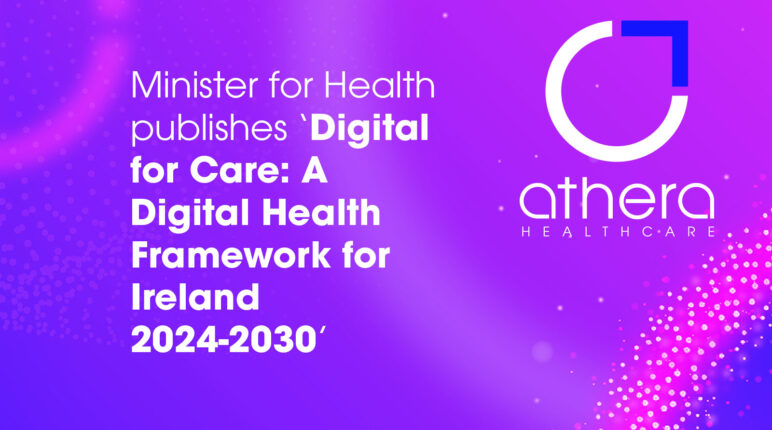Irish Health Service
Ireland Sets Out Roadmap in Digital Health Framework for 2024 – 2030

The Irish Department of Health has announced a comprehensive Digital Health Framework for 2024 – 30, aiming to transform the nation’s healthcare services through digital innovation. The framework outlines key areas of development such as the roll-out of a shared care record, the implementation of electronic health records (EHRs), and the introduction of a new patient app.
It emphasises patient empowerment, workforce enhancement, and data-driven decision-making as core components of a better healthcare system. As a national solution in traceability for the Health Service Executive (HSE) of Ireland, Athera Healthcare is dedicated to driving these transformative changes, ensuring Ireland’s healthcare system reaches new heights of efficiency and patient care.
Empowering patients through digital health
A key goal of the new framework is to empower patients by improving their access to health information and encouraging them to partake in self-care and early diagnosis. The framework plans to make health data more accessible to the community, promoting a proactive approach to personal health management.
Supporting a digitally enabled workforce
Another significant aspect of the framework is its focus on creating a digitally enabled workforce. By providing healthcare staff with digital identities and single sign-on systems, the framework aims to streamline workflows and reduce administrative burdens.
Already, Ireland’s HSE utilises Athera FingerPrint for comprehensive inventory management and traceability. This doesn’t just extend to end-to-end traceability, which offers complete visibility over medical instruments throughout their lifecycle (allowing medical teams to prioritise equipment needed for surgeries) but it also enables:
- Automated alerts: teams can set up automated alerts for equipment expiry, need and prioritisation. This minimises the risk of using expired or unsafe equipment and ensures timely restocking in preparation for surgeries
- Paperwork reduction: by digitising inventory management, Athera FingerPrint eliminates the need for manual paperwork. This not only reduces administrative burden but also minimises errors associated with manual data entry, improving overall accuracy and efficiency
- Operational Efficiency: With detailed visibility into stock levels and usage history, healthcare facilities can optimise their inventory management, reducing financial wastage and ensuring that critical equipment is always available when needed
High-speed connectivity and specialised workstations are also part of the plan, ensuring that healthcare professionals have the tools they need to deliver efficient and effective care.
Due to the diverse and high number of technologies already used across hospitals and medical teams, these workstations can only be properly implemented with solutions that are adaptable. Integration is what will define the next phase of healthcare digitisation; because of the sheer complexity, vastness, and diversity of healthcare technologies, processes, and systems used, flexibility from healthcare technology providers is key to overcoming this challenge.
However, the biggest health-tech players in the market currently do not provide the flexibility needed for the effective and seamless digitisation of healthcare. Adoption of their technology means that many healthcare units must adapt their existing systems, which is a lengthy implementation and learning process and therefore time-consuming for an already overworked workforce. That’s why Athera Healthcare remains flexible and customisable to customer needs.
Data-driven decision making
One of the framework’s ambitions is to use data more effectively to manage and improve the performance of health services. By providing access to the right information through advanced systems and dashboards, healthcare providers can gain better insights into patient flow and population health trends.
This data-driven approach is intended to help the health service respond more effectively to both short-term and long-term challenges.
Data, such as that provided by Athera, allows healthcare providers to make both small and large operational changes. From knowing which surgical trays to prioritise cleaning for to ensure their readiness for upcoming procedures, to using clinical audits to know at which stage of a patient’s stay more attention and manned care is needed to prevent illness escalation. We are seeing more healthcare practices utilising data to streamline and standardise operations; a necessary move to meet the framework by 2030.
Investment in health infrastructure and emerging technologies
The framework also underscores the importance of continued investment in health infrastructure and emerging technologies. This includes the integration of various health systems and the development of standards to enhance connectivity and interoperability. The planned roll-out of a new patient app later in 2024 and the scale-up of virtual care initiatives are examples of how technology will be leveraged to improve healthcare delivery.
Digitally enabled and connected care
The move towards digitally enabled and connected care is a cornerstone of the framework. This includes the adoption of standardised digital patient records and reducing reliance on paper documentation. By enhancing data accessibility for clinical audits and research, the framework aims to improve the quality of care and facilitate better clinical outcomes. These changes are expected to lead to a more integrated healthcare system, where information flows seamlessly across different care settings.
Already, Athera Healthcare is working with both partners and customers to enhance the accessibility of data across hospitals and healthcare practices, whereby information, such as instrument labelling or patient data, is standardised and can be accessed on a single dashboard.
In summary:
Ireland’s Digital Health Framework for 2024 – 2030 represents a significant step forward in modernising the country’s healthcare system. By focusing on patient empowerment, workforce enhancement, and data-driven decision-making, the framework aims to build a more efficient, connected, and patient-centred healthcare system. As Ireland embarks on this digital transformation journey, the integration of innovative technologies and data management solutions, such as those provided by Athera Healthcare, are critical to achieving these goals.
For more details on the Digital Health Framework and its implications for Ireland’s healthcare system, you can access the full document here.
Book a Demo
Arrange a one-to-one demonstration with a member of our dedicated team. We collaborate to tailor the experience so you can see how our solutions can be applied in your specific context and utilised effectively to achieve your objectives.